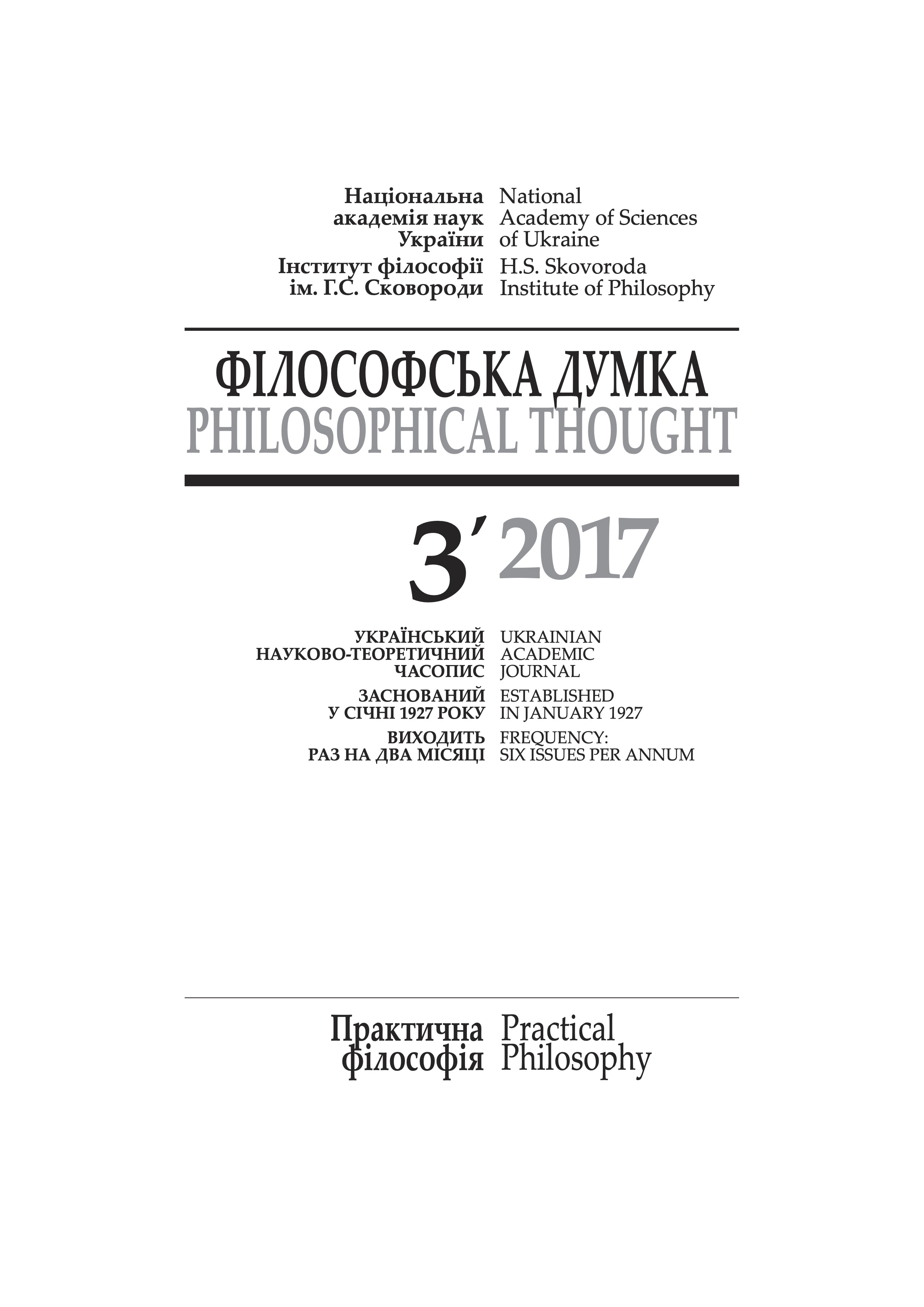Свідомий досвід та антиредукціонізм у філософії Девіда Чалмерса
Ключові слова:
Девід Чалмерс, Едмунд Гусерль, феноменальний досвід, кваліа, свідомість, інтенційністьАнотація
У статті аналізуються п’ять арґументів проти редукціонізму, наведені Чалмерсом у праці «The Conscious Mind», узагальнюється їхній зміст та оцінюється їхня теоретична вага. У першій частині автор статті коротко формулює відмінність між двома парами понять філософії Чалмерса: психологічної і феноменальної свідомості; легких і важкої проблем свідомості. Друга частина являє собою короткий огляд п’яти арґументів проти редукціонізму. У третій частині автор дає критичну оцінку наведеним арґументам і протиставляє їм сильніший арґумент інтенційності. У четвертій частині порівнюються підходи Чалмерса і Гусерля, особливо в контексті їхньої критики редукціонізму. Підбиваючи підсумок, автор пропонує відмінне від Чалмерсового поняття феноменальності досвіду, щільно пов’язане з поняттям інтенційності.
Посилання
Bogachov, A., Vakhtel, A., Verloka, V., Ivashchenko, I., Ivashchenko, S., Kebuladze, V., Komar, O., Leonov, A., Panych, O., Sepetyi, D., Khoma, O., Fostyak, T., Tsyba, V. (2015). Translation as (mis)understanding. Terminological discussion. [In Ukrainian] In: Filosofs’ka dumka, № 5, p. 68 — 94. [= Кебуладзе 2015]
Vakhtel, A., Kebuladze, V., Komar, O., Leonov, A., Sepetyi, D., Synytsia, A., Sukhovyi, V.,
Tsyba, V. (2016). Translation as (mis)understanding. Terminological discussion. What is it like to be a zombie. [In Ukrainian] In: Filosofs’ka dumka, № 1, p. 83–112. [= Кебуладзе 2016]
Vakhtel, А. (2015). The Article of Aron Gurwitsch “On the Intentionality of Consciousness”: Theoretical Context and Linguistic Peculiarities. [In Ukrainian] In: Filosofs’ka dumka, № 5, p. 6–14. [= Вахтель 2015]
Gurwitsch, A. (2015). On the Intentionality of Consciousness. [In Ukrainian] In: Filosofs’ka dumka, № 5, p. 14–30. [= Ґурвіч 2015]
Brentano, F. (1874). Psychology from an Empirical Standpoint. B. 1 [In German] Leipzig: Duncker & Humblot.
Chalmers, D. (2010). Facing Up to the Problem of Consciousness. In: Chalmers D. The Character of Consciousness. Oxford University Press, p. 3–28. https://doi.org/10.1093/acprof:oso/9780195311105.003.0001
Chalmers, D. (1996). The Conscious Mind. In a Search of a Theory of Conscious Experience. Oxford; New York: Oxford University Press.
Dennet, D. (1988). Quining Qualia. In: Consciousness in Contemporary Science. Ed. by A.J. Mar cel, E. Bisiach. Oxford University Press, p. 381–414.
Dupuy, J.-P. (1999). Philosophy and Cognition: Historical Roots. In: Naturalizing Phenomenology: Issues in Contemporary Phenomenology and Cognitive Science. Ed. by J. Petitot, F. Varela, B. Pachoud, J.-M. Roy. Stanford, CA: Stanford University Press, p. 539–561.
Gallagher, S., Zahavi, D. (2008). Phenomenological Mind. An Introduction to Phenomenology and the Cognitive Science. New York, London, Ontario: Routledge.
Husserl, E. (1939). Experience and Judgment. Investigations in a Genealogy of Logic. Ed. by L. Landgrebe. [In German] Prag: Academia Verlagsbuchhandlung.
Husserl, E. (1976). Ideas Pertaining to a Pure Phenomenology and to a Phenomenological Philosophy. First Book: General Introduction to a Pure Phenomenology. Ed. by K. Schuhmann [In German] Den Haag: Martinus Nijhoff. (Husserliana III/1).
Husserl, E. (1913). Logical Investigations. Vol. 1: Prolegomena to Pure Logic. 2nd edition. [In German] Halle: Niemeyer.
Husserl, E. (1987). Philosophie as a Rigorous Science. [In German] In: Husserl E. Essays and Lectures (1911–1921). Ed. by Thomas Nenon and Hans Rainer Sepp. Dordrecht, Boston, Lancaster: Martinus Nijhoff Publishers. (Husserliana XXV), p. 3–63.
Jackson, F. (1982). Epiphenomenal Qualia. In: Philosophical Quarterly, 32, p. 127–136. https://doi.org/10.2307/2960077
Lohmar, D. (2008). Phenomenology of the weak Phantasy. Investigations of Psychology, Cognitive
Science, Neurology und Phenomenology of Function of the Phantasy in Perception. [In German] Springer.
McGinn, C. (1991). The Problem of Consciousness. Blackwell: Oxford.
Nagel, T. (1974). What is it like to be a bat? In: Philosophical Review, 82, p. 435–450. https://doi.org/10.2307/2183914
Rudd, A.J. (s.a.). What it’s like and what’s really wrong with physicalism: a Wittgensteinian perspective. Retrieved from http://www.imprint.co.uk/rudd/wittgens.htm/
##submission.downloads##
-
PDF
Завантажень: 285
Опубліковано
Як цитувати
Номер
Розділ
Ліцензія
Автори, які публікуються у цьому журналі, згодні з наступними умовами:
- Автори зберігають авторське право і надають журналу право першої публікації.
- Автори можуть укладати окремі, додаткові договірні угоди з неексклюзивного поширення опублікованої журналом версії статті (наприклад, розмістити її в інститутському репозиторії або опублікувати її в книзі), з визнанням її первісної публікації в цьому журналі.
- Авторам дозволяється і рекомендується розміщувати їхню роботу в Інтернеті (наприклад, в інституційних сховищах або на їхньому сайті) до і під час процесу подачі, так як це може привести до продуктивних обмінів, а також скорішого і ширшого цитування опублікованих робіт (див. вплив відкритого доступу).


